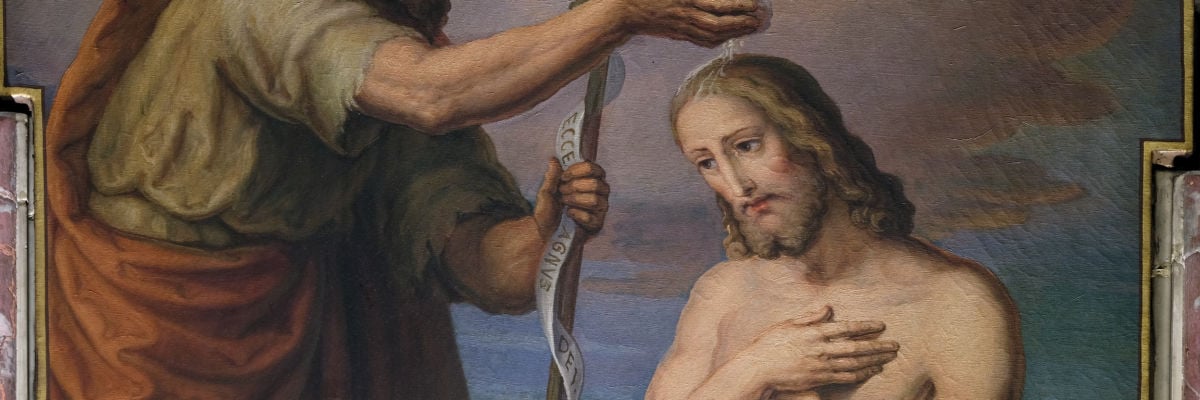
In this episode of Catholic Answers Live, apologist Karlo Broussard joins host Edgar Lujano to explain why the Church requires the RCIA (Rite of Christian Initiation for Adults) process before baptism and full communion. They discuss how RCIA isn’t just about learning facts — it’s about formation, discernment, and deep commitment to the Catholic faith.
Transcript:
Caller: So my mother and I are Catholic, but my father is not. And he was wondering why, if he wanted to join our church, why he’d have to do OCIA. Why can’t he just kind of get baptized in like a big tub like some of the other churches do?
Karlo: Listen, Taylor, this is a good question and many people ask it. So hopefully what I share with you here can make sense so that you can in turn share it with your father.
So it really sort of depends upon who the non-Catholic is and where they’re at in their journey concerning their relationship with the Lord. The reason why I say that is because for some non-Catholics who are seeking to enter into the church, Taylor, OCIA would not be required for them if the pastor is able to discern that that particular person is manifesting such a deep love for Christ and has proper formation to where the pastor can make a reasonable judgment and say, you know what, this guy is ready to come into the church already.
And so there’s really no need to go through a long process of OCIA to get him ready to make sure and ensure that he’s ready to take on the responsibilities that come with being a member of Christ’s body and being a Catholic, because the pastor can make that judgment.
Now concerning other types of people who maybe perhaps are just beginning to have faith in Christ or just beginning to think about Catholicism, and they’re saying, you know what? This is pretty much attractive to me and I want to pursue it.
So what the church does, Taylor, in her wisdom, is to do her best to follow certain teachings or to allow this process for somebody to go through in order to sort of test the motivations for becoming Catholic and to ensure or make sure that the person is becoming Catholic for the right reasons and that the seed of the Word of God will be planted in the fertile soil.
It’s basically the Church’s way of tilling the soil of the soul to make sure that the seed of the Word of God is going to embed itself and root itself deeply so that fruit can bear, such that the person who becomes Catholic doesn’t wither away and end up falling away from Catholicism.
And here’s the reason why, Taylor, the Church does this. Our Lord teaches us in Luke, chapter 8, verses 14 through 15. Are you familiar with the parable of the sower of the seed where Jesus talks about how one will sow seed on the path where the birds come and pick it away, sowed seed on the rocks to where the seed bears some fruit, but then it withers away, and then the seed that’s sown in thickets where it starts to sprout, but then it’s choked out. And then the seed that’s sown in fertile soil where it bears much fruit.
So hopefully you’re familiar with that parable. But here’s what Jesus teaches us, Taylor, about the seed that’s sown on the rocks. In Luke, chapter 8, verse 13, he says, those are the ones who hear the Word, receive it with joy, but it has no root. And so they believe for a while, and in time of temptation, they fall away.
Now, given this, you know what St. Peter teaches us. In Second Peter, chapter 2, verses 20 through 22, he articulates some Christians who have fled from the defilements of the world. That means they’ve been set free from the slavery of sin and have entered into a saving relationship with Jesus. They became one with Christ.
But St. Peter goes on to say that they return back to the defilements of the world after having knowledge of Jesus Christ. And he’s not just talking about intellectual knowledge, he’s talking about having a relationship with Christ. And then he says in verses 21 through 22, the latter state of going back to the defilements of the world is worse than the first state when they were in the defilements of the world prior to coming into relationship with Christ.
And then he says in verse 22, the dog is like the dog returning to its vomit. A very graphic image there, Taylor.
So given this revelation from our Lord and St. Peter put together, the Church in her wisdom wants to make sure that these people who are saying, hey, I want to become Catholic, I want to become Catholic. They want to. The Church wants to do its best and given the means that it has, to make sure that the soil is tilled and ripe for the seed to be planted and to make sure that the seed is not being thrown to the rocks such that it will come up bearing fruit.
And then the individual falls away, and the latter being worse than the former state. The Church wants to do her best to try and avoid those situations. So it’s basically the Church looking out for the people, inquiring about and wanting to become Catholic and making sure that the soil is ready for the seed of the Word of God through baptism to be planted so that it can bear good fruit and be rooted, so that those people who come into the faith can have a reasonable confidence, Taylor, that those people will be the ones who are like the seed sown in the good soil, and they believe and they remain in their belief.
What are your thoughts in response to that? Do you think that’s helpful?
Caller: Yeah, that makes sense. My mother and I are actually going through confirmation right now, but we’re Catholic. We’ve all had to do classes. It’s just a lot less involved process. So we’re getting confirmed on Pentecost by our bishop.
Karlo: Beautiful. Blessed be God. Well, Taylor, congrats on that. And praise the Lord for the grace that he’s given you and your mom to be moved to have that desire to want to receive the full initiation into the church. And praise God for that.
And then for your father, Taylor, we’ll offer up a prayer that the Lord will continue to work on his heart.
Caller: All right, thank you.
Cy: Thank you, Taylor. Thank you for your call. With that, we go to our first break.



